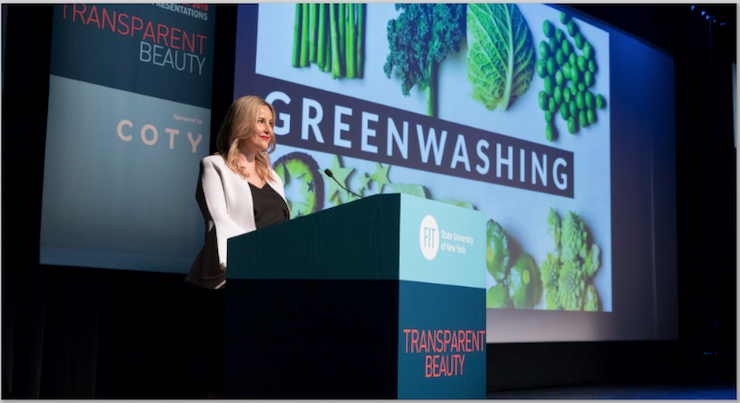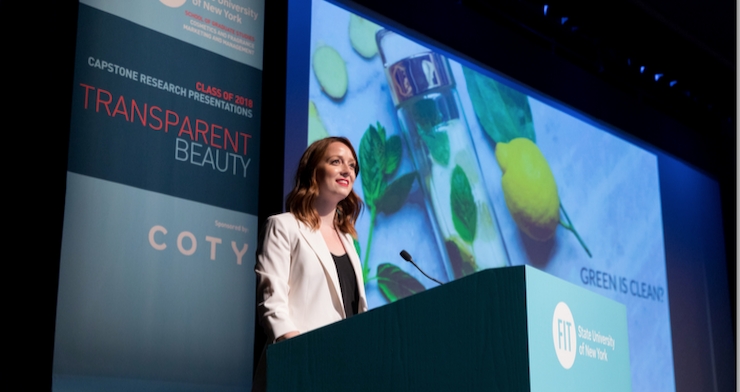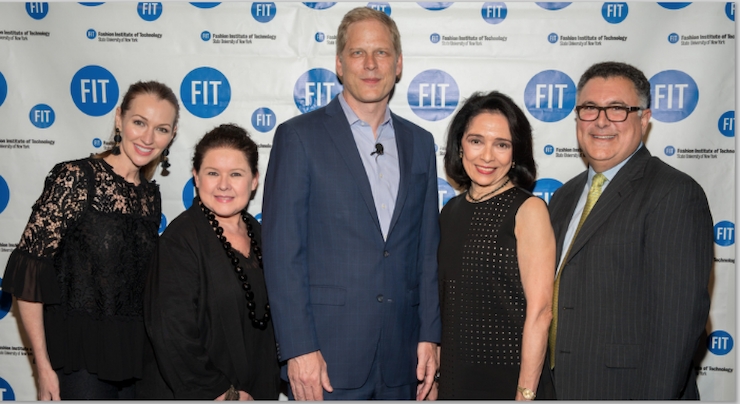Nancy Jeffries, Correspondent07.05.18
Is the beauty industry ready for transparency? That was the question of the moment, as graduates of The Fashion Institute of Technology’s (FIT) Master of Professional Studies program in Cosmetics and Fragrance Marketing and Management (CFMM) presented their Capstone Research findings. This year’s presentation, held June 13, 2018, at the Haft Theater, FIT, focused on Transparent Beauty, Clean Beauty, and Glassbox Leadership and Organizations.
The CFMM graduate students examined 21st Century values of wellness, the emerging consumer demand for transparency, and the paths that beauty brands and companies are taking as they evolve. Topics included the notion of clean beauty and the rise of naturals; as well as the ways in which consumers define clean beauty, vis-a-vis cruelty-free, vegan, gluten-free, or sustainable prisms.
In looking at Glassbox Leadership, the students discussed corporations thriving in a transparent world, and focused on technology, access to information, newly empowered citizens, and an increasingly knowledgeable consumer population. They explored some of the ways in which consumers use their influence to drive social change; and how a brand’s survival may ultimately be determined by its ability to operate as a Glassbox Organization, which provides accountability at every turn.
Welcome and Keynote
Jerry Vittoria, President, Fine Fragrance Worldwide, Firmenich, Chair, Cosmetics and Fragrance Marketing and Management Industry Advisory Board, and Director, FIT Foundation; and Corey Moran, Head of Industry, Fashion and Luxury, Google, Class of 2015 Department Medal Winner, and Director, FIT Foundation, welcomed Dr. Joyce F. Brown, President of FIT, to collectively celebrate the 2018 graduates.
Dr. Brown noted that the CFMM program was now in its 18th year. “It is the only program like it, and I have watched its remarkable growth into an incubator of ideas for the fragrance and cosmetic industry,” she said. She thanked sponsor, Coty Inc., for their support of the Professional Development program and the evening’s presentation; and acknowledged the contribution of Professor Stephan Kanlian, who founded the program 18 years ago.
Shannon Curtin, Senior Vice President, Consumer Beauty North America, Coty, Inc., provided the sponsor’s remarks, describing the CFMM program as a think tank, and noting how lucky she was to be in an industry she is so passionate about. Jokingly referring to the “no make-up makeup look that took her 20 products to create,” she said, “Makeup is a tool for transformation, and one of the newest ideas in the industry today is transparency. It is a cultural movement right now to have transparency and truth,” said Curtin.
Norman de Greve, Chief Marketing Officer, CVS Health, provided the Keynote remarks, emphasizing the difference that business can make in the world of beauty and wellness. He said that CVS eliminated tobacco from its shelves in 2016, and continues to practice transparency by removing retouched advertising on beauty products carried at CVS.
He said, “Beauty has traditionally been shown top down, with models with perfect skin and makeup, and then retouching went on to an extent where models didn’t even recognize themselves.” He quoted actress, Lupita Nyongo, who said that for her entire life she had been “sold the seduction of her inadequacy.” De Greve said, “Think about the effect of this.” He explained, however, that times are indeed changing. “Today we take more photos than we ever have, and in that, there is power. Along the way, influencers were creating the authentic looks we are seeing, with a reach of 135 million followers. In a way, beauty went from top down, to bottom up. Authenticity now beats altered images,” said de Greve. He noted the CVS commitment to not digitally alter beauty images in their stores, and the creation of the CVS Beauty Mark, designating products bearing unaltered images.
“We want people to buy beauty, but not in a way that makes them feel bad about themselves. CVS is a purpose-driven brand,” he said, explaining their mission to Stand Up, Stand Out, and Stand Firm. “Remember to retain transparency. If we do it together we can have a lasting mark,” said de Greve.
Transparency and Truth
Capstone research revealed that beauty with transparency in both communication and values is resonating with consumers today. The erosion of trust has enabled deeper exploration of entities in business and beyond, and accountability has come to the fore. FIT’s Transparency Perception Assessment Survey of 1,800 respondents identified trust gaps between consumers and brands, and explained how the transparency trend is translating to emotional security.
Findings revealed that communication is key and consumers want brands to do a better job of explaining what they offer, including ingredient safety, product information, and career progress information for employees. Consumers value promise over profit, with 66% saying they want to know more about testing; and 59% interested in environmental impact.
Company culture is also key, as trust is driven by an alignment of values. Findings revealed that consumers value brands that are introspective and accountable; and that 82% of the working population chooses their next job because a company’s culture and mission align with their values.
Impact of Clean Beauty
The emergence of the clean beauty movement is a symptom of growing consumer mistrust in the beauty industry, observed the students, saying, “The time for transparency has come and brands need to adapt in the process.” They noted, “Even the most artificial products are trying to be cleaner in some way.”
The transparency trend, where knowledge is crucial and authenticity and relatability are key, has given beauty brands the opportunity to evolve their industry practices and rebuild trust. Four elements within the transparency gap that exists between brands and consumers comprise the Clear Beauty Radical Transparency Model, which the students created in their research. These are knowledge, authenticity, relatability and collaboration.
Within the Knowledge component, students observed that consumers want clear information, and companies can empower consumers through education and targeted content. In the future, they can utilize Google Translate and Google Lens technology to create the clearBEAUTY app, which could translate what ingredients do in lay terms and enable consumers to understand data.
The Authenticity element showed that consumers want products that deliver results, and 72% of respondents said they wanted to know what ingredients do, as well as where they come from. “Brand websites should simplify the user journey and be a credible source for consumers,” they said.
In addition to noting expiration dates and batch codes on beauty products, just like perishable foods, they emphasized traceability through block chain, to build trust so that consumers know how ingredients are sourced, supplied, and distributed. “Opaque supply chains are at risk, and block chain transparency should be leveraged by the beauty industry,” they said. Their research revealed that IBM is developing tamper-proof chips, which can authenticate a product’s journey, and enhance the building of trust and transparency.
The Relatability component showed that consumers want brands that are reflections of themselves, and value a dialogue with brands. They discussed the rise of genetic testing to enhance predictive personalization and the growth of individualized formulations, as consumers are more willing to participate in DNA sharing, as long as safety is assured. They said this will enhance the ability to predict what kind of skin or hair care products would suit an individual’s needs.
The final element, Collaboration, emphasized the need for the industry to come together to answer the consumer demand for transparency. Whether niche, heritage, mass or prestige, retailer or distributor, partner or competitor, collaboration was key.
Glassbox Beauty Business
Today, individuals are experiencing a deluge of data, with 70% of our waking hours devoted to consuming data; and, said the students, 75% of people do not realize that their data is being captured. Transparency, they acknowledged, is a catalyst for societal shifts, and movements are growing among students and activists coalescing around identity, security, and opportunity.
The students theorized that, “Corporations are becoming the new countries, and should assume the responsibility that comes with their power.” They urged that intentions should be at the center of companies, with their values communicated internally and externally. “Research has shown that 66% of millennials prefer a company that stands for something,” they said, citing Apple and Everlane as companies that have stood by their values.
“Companies must foster trust and must make ownership and accountability a lived value,” they said. They should provide employee opportunities, including geographic mobility, and foster the flow of internal community via trust and equal opportunity. “The change must start from within. The disparity between executive roles is still in need of change, with the majority of executive roles still not reflective of the diversity in today’s world,” they said.
The Awards Ceremony
Jessica Abrams, Director, Product Development, Global Makeup Center of Excellence, Shiseido; and Chair, Cosmetics and Fragrance Alumni Association; and Caroline Ornst, Fragrance Development Director-Fine Fragrance, Firmenich, and Co-Chair, Cosmetics and Fragrance Alumni Association, introduced the award presentation with a quote from Eleanor Roosevelt, saying, “The future belongs to those who believe in the beauty of their dreams.”
Outstanding Scholar Award winners were Lindsay Powell Schwartz, Influencer Marketing and Public Relations, Coty; and Bea Asavajaru, Social Media, Shiseido.
The Coty Award for Professional Excellence was awarded to Yumiko Nishikawa, Director, Makeup and Fragrance, Shiseido. Coty donated $10,000 to the CFMM program on her behalf.
Estée Lauder Companies Faculty Leadership Award was presented to Professor Leslie Harris, Adjunct Instructor, Cosmetics and Fragrance Marketing and Management. The annual $10,000 award is designated for faculty development in the CFMM program.
The Limited Brands Student Leadership Award was presented to Jennifer Nuttall, Global Marketing, Revlon, Inc. This $10,000 award is designated for the FIT CFMM program to support team building among the student body.
The Department Medal, presented by the Class of 2017 Department Medal recipient, Crystal Sai, Marketing Director, Makeup and Fragrance, Estée Lauder North America, was awarded to Jessica Bibby, Marketing, Estée Lauder Companies.
Dorene Kaplan, Industry/Project Manager, Master’s Program: Cosmetics and Fragrance Marketing and Management, FIT, closed the program and invited everyone to celebrate the graduates of the Class of 2018.































